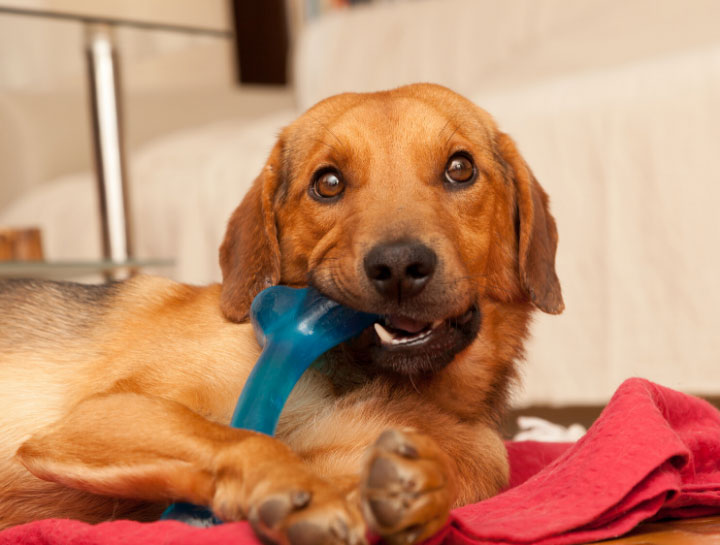Preventive Dental Care
Routine dental care matters.
On This Page
Does my pet really need a dentist?
Symptoms. Pet parents must remember that many pets do not show outward signs or symptoms that we associate with dental pain. They may notice the following signs of dental problems in pets, but be unaware of the unspoken pain:
- Red and swollen gums
- Buildup of yellowish plaque
- Apparent pain when eating
- Loss of appetite
- Drooling
- Bad Breath
- Loss of weight
- Change in grooming habits
Conditions. If left untreated, dental problems can progress to more serious and life-threatening conditions in pets, such as:
- Loose teeth (in adult dogs with healthy gums)
- Crooked teeth
- Cracked or broken teeth
- Gum disease (periodontitis) in cats and dogs
- FORLs (feline odontoclastic resorptive lesions)
- FGS (feline gingivitis/stomatitis syndrome)
- Feline oral cancer
- Tooth root abscess [or infection]
Many dental problems cause pain, but survival instincts impel pets to hide their pain. Is it possible to find what your pet is hiding? Our veterinarians can diagnose and treat these common dental issues. They can both find and eliminate the pain. For answers to questions about anesthesia for your pet during dental cleanings, please read this informative article on ScienceBasedMedicine.com.
But the best way to eliminate pain is to prevent it…early. While gingivitis can progress to periodontal disease, it is at the gingivitis stage that treatment can restore your pet's dental health to normal. Once periodontal tissue and bone begin to deteriorate, however, the condition can become irreversible. Periodontal disease is a major cause of damage to the heart, lungs, kidneys, and liver. Preventing significant dental deterioration can protect these organs from the bacteremia (bacteria traveling through the bloodstream) associated with periodontal disease.
Video: "Why Pet Dentistry?" (0:59)—Dr. Benham shares why pet dentistry is so important to the total health of our beloved pets.
Video Transcript
After I had been in practice for a few years, I started to recognize that there was one disease that virtually every one of my patients had and that was dental disease, whether it was a little bit of tartar, some chipped enamel, or a more severe problem.
Sometimes these problems are even life-threatening. Just like in people, disease in the mouth can cause problems other places in the body. It’s not just a sore tooth or an infection in the mouth, but it can cause problems with the heart, or spinal cord disease, or kidney disease, or any number of other problems.
It’s one disease where our animals tend to suffer in silence. They don’t complain. They don’t walk around holding their little faces. So, we don’t know just how much they’re suffering until we relieve that pain and we see how much happier they are.
What will my veterinarian do for my pet?
Prevention. We recommend our light dental cleaning procedure on a regular basis to prevent periodontal disease. Our veterinarians are not content to simply treat dental problems after they’ve become serious. We want to prevent them from occurring in the first place, with the following preventive dental procedures:
- Bi-annual exam
- Annual dental cleaning (bi-annual is recommended if you don’t brush your pet's teeth weekly)
- Antibiotics with a dental cleaning, if needed
Treatment. If your pet develops a serious dental condition, our veterinarians can recommend treatments that will help to address the problem and the pain. These may include:
- Removal of excessive gingival tissue, if needed
- Removal of tartar
- Tooth extraction, if needed
- Complete diagnostics, in the case of FGS and oral cancer
- Biopsy, in the case of FGS and oral cancer
- Dental cleaning
- Antibiotics, if needed
FORLs are a common dental issue for cats, and the most common treatment is tooth extraction. Our veterinarians use careful techniques to remove feline teeth and affected tissue.
FGS and feline oral cancer require extensive diagnostics and treatment. Our veterinarians will perform a physical exam, blood test, feline serology, extraction, biopsy, and more to ensure total treatment of your cat. However, a clinical cure for oral cancer may not be possible.
We want to make certain that your pet receives compassionate care during times of oral distress. Advanced dental procedures can be performed at our extensive dental center at Northeast Animal Hospital. Our technicians at both locations can help you find answers and relief.
What can I do for my pet’s dental health?
- Brush your pet’s teeth daily. If you find it impossible to brush your pet's teeth, consider an oral rinse, gel, spray, or water additive. These are no substitute for brushing, but they may help make a difference in your pet's dental health.
- Schedule a dental exam and cleaning annually. Schedule them bi-annually if you don’t brush your pet’s teeth at least weekly.
You may also wish to explore a selection of diets formulated to help care for your pet's oral health. Please speak to one of our technicians to discover options.
Call us to schedule your pet’s oral health assessment or dental cleaning.
Northeast (727) 822-8501 | Downtown (727) 755-7387

